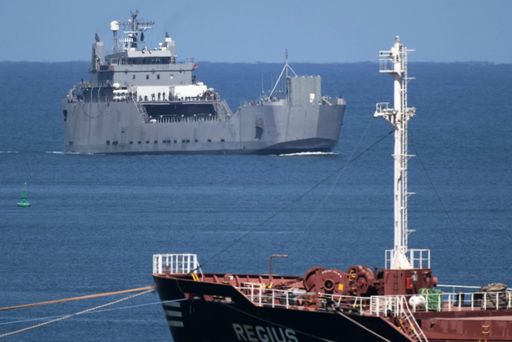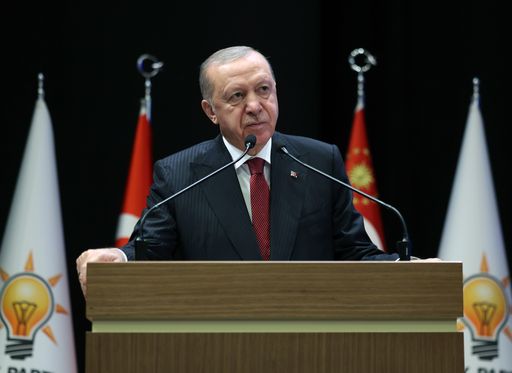Tens of thousands of people took to the streets across Europe on Thursday to protest Israel's attack on the Global Sumud Flotilla, which was sailing towards Gaza with humanitarian aid when it was stormed and seized by Israeli forces.
The flotilla, which organisers described as the largest coordinated effort to deliver aid by sea, was attacked on October 1 as it approached Gaza's waters. The Israeli navy forcibly commandeered dozens of boats and detained hundreds of passengers, including citizens from several European countries.
In France, people gathered in Paris’ historic Place de la Republique to denounce the attack. Carrying Palestinian flags, the crowd chanted slogans such as "Israel out, Palestine is not yours" and "Long live Palestine."
Protesters demanded the release of flotilla activists, among them French nationals, who remain in Israeli detention.
In Belgium, hundreds of people rallied in Brussels in front of the Foreign Ministry in a protest organised by several civil society groups.
Demonstrators marched under the theme "All eyes on Gaza," waving Palestinian flags and wearing keffiyehs as a symbol of solidarity.
The protest moved from the Foreign Ministry to Luxembourg Square in front of the European Parliament, where crowds chanted "Free Palestine," "Solidarity with Palestine," and "Freedom for Gaza."
Protesters urged Belgian and EU institutions to step up support for the flotilla and for the Palestinian people.
In Spain, solidarity rallies took place in 24 major cities, led by several civil society groups and political parties.
Madrid and Barcelona became focal points of the demonstrations. Thousands gathered outside the Foreign Ministry’s residence at Santa Cruz Palace in Madrid, calling for the immediate release of detained flotilla members and urging the government to impose tougher sanctions on Israeli Prime Minister Benjamin Netanyahu's administration.
Chants of "Boycott Israel," "Stop the genocide," and "Free Palestine" echoed through the capital, while some protesters attempted to block main roads, leading to brief clashes with police.

Protesters demand action
In Barcelona, demonstrations took place both at the port where the flotilla had departed on August 30 and outside the Israeli Consulate. Families of the detained joined activists, demanding urgent diplomatic action.
Similar protests were reported in Valencia, Pamplona, Toledo, Seville, and Bilbao, with weekend marches expected to draw even larger crowds.
Anger also spilled into local politics. In Madrid's regional parliament, the left-leaning Mas Madrid party displayed a Palestinian flag inside the chamber, sparking disputes with members of the ruling conservative Popular Party.
In Aragon's parliament, lawmakers observed a minute of silence for Gaza and the flotilla, though far-right Vox representatives walked out in protest.
Spanish Foreign Minister Jose Manuel Albares launched what local media called "telephone diplomacy," speaking with his counterparts in Türkiye, Belgium, Ireland, Brazil, and EU Foreign Policy Chief Kaja Kallas to push for a joint stance on defending flotilla members.
In Switzerland, thousands demonstrated in Geneva’s Lisa Girardin Square, chanting slogans in French, Arabic, and English. Protesters demanded an end to Israel's blockade and called for unhindered delivery of humanitarian aid to Gaza.
Rallies were also reported in Bern, Basel, Lugano, Lucerne, and Zurich. The Geneva protest lasted hours under heavy police presence and ended without incident.
In the UK, hundreds gathered in London’s Parliament Square before marching towards Whitehall, home to government offices. Demonstrators waving Palestinian flags shouted, "Free Palestine" and "Don't bomb Gaza."
As the crowd spilled into the streets, traffic came to a halt, with some bus drivers honking in solidarity. Police later blocked protesters from advancing to Trafalgar Square, leading to confrontations and several arrests. Smaller protests were also reported in other parts of the capital.
In Greece, thousands marched in Athens towards the Israeli Embassy, chanting "End the genocide in Gaza" and "Break the blockade, free Palestine."
Organisers read a joint statement condemning Israel for violating international law and stressing that the flotilla's mission was a legitimate attempt to deliver humanitarian aid.
Parallel protests took place in Thessaloniki, Patras, Chania, Lesbos, Chios, Volos, and Larissa, with participants calling for the immediate release of 27 Greek nationals detained aboard the flotilla.

Gaza under siege
Israeli naval forces attacked the flotilla as it approached Gaza's coast late on Wednesday and detained at least 443 activists on board, organisers said.
The International Committee to Break the Siege on Gaza (ICBSG) confirmed that 22 ships have been attacked and seized by Israeli forces, and 19 are believed to have been attacked, but it has not yet documented them.
Of the four vessels remaining, two support ships turned back, while the vessel Marinette continued sailing towards Gaza but was still far away after a late arrival due to technical malfunctions, it added.
The flotilla, loaded mainly with humanitarian aid and medical supplies, set sail at the end of August. It was the first time in years that around 50 ships sailed together towards Gaza, carrying hundreds of civilian supporters.
Israel has maintained a blockade on Gaza, home to nearly 2.4 million, for nearly 18 years, and further tightened the siege in March when it closed border crossings and blocked food and medicine deliveries, pushing the enclave into famine.
Since October 2023, Israeli bombardment has killed more than 66,200 Palestinians, most of them women and children.
The UN and major rights bodies have repeatedly warned that the besieged enclave is being rendered uninhabitable, with starvation and disease spreading rapidly.




















